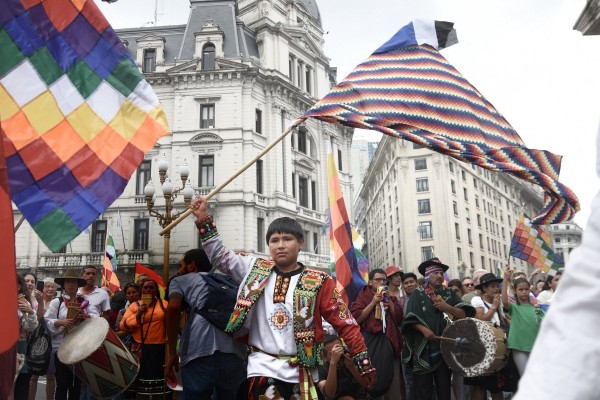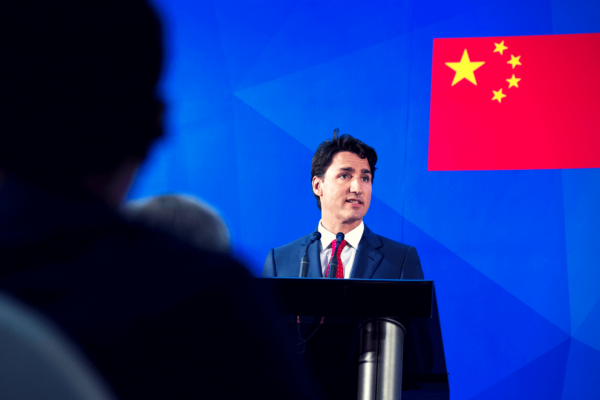Why a reset of Canada-China relations is more urgent than ever
The world doesn’t need a second Cold War. Calling for an end to Canada’s One China policy pushes us further down that path

Xi Jinping, President of the People’s Republic of China, speaks at a United Nations office in Geneva, January 18, 2017. United Nations Photo by Jean-Marc Ferré/Flickr.
On September 9, Georgia Straight editor Charlie Smith published an opinion piece arguing that the candidates in the current race for the leadership of the Green Party of Canada should challenge Ottawa’s One China policy. According to Smith, the candidates “missed an opportunity to win over the large number of Canadians who trace their roots back to Hong Kong and Taiwan and who are thoroughly disgusted with the behaviour of the Chinese government.”
Smith went on to say that if any of the GPC candidates had spoken out against the “Sinofascists in charge in China,” some of the large Hong Kong expat community in Canada “would have come out in force for any Green Party of Canada candidate who declared on their website that our country needs to respect the democratic desires of the former colony’s brave, democracy-loving residents.”
While Smith’s argument might persuade some who are caught up in the present wave of anti-China sentiment sparked in part by the COVID-19 pandemic, the premise of his argument doesn’t stand up to scrutiny. Is the surest path to victory in the GPC leadership race, as Smith suggests, to “explicitly support Hong Kong’s right to self-determination and declare unwavering support for the independence of Taiwan”? Whatever one’s opinion of the Chinese government, most Canadians understand it is not wise to interfere in the internal affairs of another country—especially one so big and powerful.
So why would an otherwise sensible individual write such a hyperbolic column about China? This might be because, as beneficiaries of Anglo-American colonialism, many Canadians are unaware of how their views might unwittingly support the same actors that are pushing for conflict with China—including the US-dominated “Five Eyes” intelligence alliance, which includes Canada, Britain, Australia and New Zealand.
Let’s start with a little background.
Between 1841 and 1997 Hong Kong was a colony and dependent territory of the United Kingdom (with a Japanese interlude during the Second World War). Hong Kong was taken over at the end of the first British Opium War. That conflict weakened China’s central government and divided the country into foreign spheres of influence.
Taiwan’s relationship to China is more complicated. Historically, the nation was subject to partial Dutch colonization in the 17th century, but did not break away from the mainland until after the nationalist Kuomintang army retreated to the island with some two million Chinese supporters in 1949 after they were defeated by Mao’s communist forces during the Chinese Civil War. For 21 years Ottawa recognized the government in Taiwan as the official representative of all China and, until 12 years ago, the governing Kuomintang party openly claimed it was the sole representative of the country.
From China’s perspective, a One China policy—the diplomatic acknowledgement that there is only one Chinese government—reflects the end of the “century of humiliation” spurred by the Opium Wars. Yet, even after Mao’s victory largely consolidated the country and strengthened the central government, foreign powers sought to weaken China. For its part, Canada sent 27,000 troops to Korea in the early 1950s where they fought Chinese troops. Canada also refused to recognize the Chinese government until 1970.
More recently, Canada has pursued various measures to isolate and weaken China. Infamously, in December 2018, Ottawa ordered the arrest of top Huawei executive Meng Wanzhou at the behest of American authorities, automatically ratcheting up tensions. The Canadian navy has also run provocative exercises near Chinese waters, while the military has explored potential sites for an operations “hub” in Singapore to take part in Pacific Rim war games with allies. In addition, Canada has stationed troops in South Korea as part of a mission to contain China, and Ottawa has sold nuclear material to India in a clear effort to counter the growing arsenal of Xi Jinping’s regime.
Unlike similar destabilization campaigns undertaken by Ottawa against countries like Venezuela, Iran, and Haiti, however, targeting China has limited negative impact on the target population. This is because China is a very large country (both in terms of geography and population) and it has mostly broken away from foreign domination. That doesn’t mean these efforts are benign, of course.
Conflict with China feeds the military-intelligence apparatus both in Canada and the United States, enabling Washington’s ‘new Cold War.’ It legitimates spending on new naval vessels and fighter jets, and helps to uphold what China expert John Price has called a “race-based” spy network that is constantly warning about China, driving trade disputes, military provocation, and a new wave of sinophobia in the West.
This posturing has broader reverberations as well. China is so powerful that the Washington-led alliance’s efforts to target it undermines humanity’s efforts to mitigate the current pandemic, the climate crisis and other pressing global matters.
The world doesn’t need a second Cold War. Calling for an end to Canada’s One China policy pushes us further down that path. So does calling for sanctions on China.
China is the most populous nation in the world. We need to accept its rise and not expect a return to its previous weak and impoverished state. We also need to acknowledge its sensitivities because of the foreign interference it has had to endure during its return to independence.
This is not an endorsement of the Chinese government’s policies in Hong Kong or Xinjiang, or an attempt to trivialize the suffering of Michael Kovrig and Michael Spavor, the two Canadians currently detained in the country. It is simply the starting point for a serious, diplomatic, and long-overdue discussion of Canada-China relations.
Yves Engler has been dubbed “one of the most important voices on the Canadian Left today” (Briarpatch), “in the mould of I.F. Stone” (Globe and Mail), and “part of that rare but growing group of social critics unafraid to confront Canada’s self-satisfied myths” (Quill & Quire). He has published nine books.










